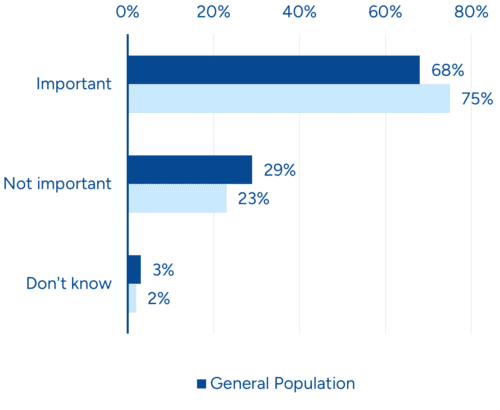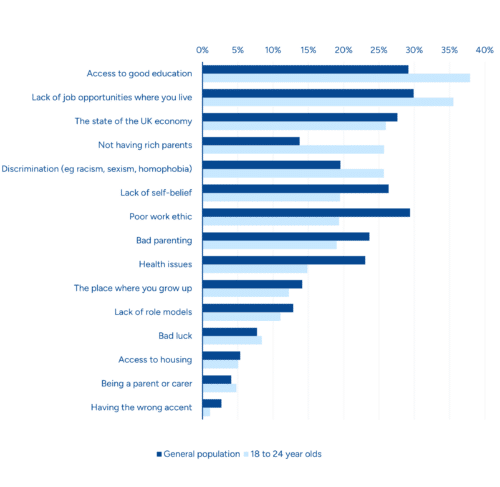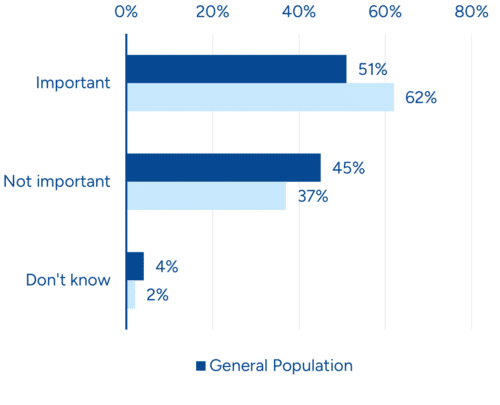Alumni
Young people are the future. They are also arguably the most affected by and best placed to comment on the social mobility landscape. They have the most recent first-hand experience of the education system, are facing some of the largest challenges in the ongoing housing crisis, and are likely to be the most active in exploring the country’s employment opportunities as they navigate their early careers.
So what are their views when it comes to equality of opportunity in Britain today? Here we examine young peoples’ (18-24 year-olds) views on social mobility and social inequality, based on recent nationwide polling carried out by More in Common for the Sutton Trust.
On inequality
Looking at the broader population, people in Britain recognise there is a big class gap today, with children from richer families getting better opportunities than others. However, younger people showed a greater awareness of these social inequalities than the population as a whole.
Only about 1 in 5 18-24 year-olds think that every young person in the UK has the same opportunity to succeed (21%), slightly lower than the 1 in 4 (25%) who said the same in the general population. More than half say it is harder for young people to have success now than it was for older generations (57% compared to 47% more widely). Similarly, 75% say coming from a wealthy family is important for getting ahead in life (compared to just 68% saying the same in the general population) and 84% (compared to 78%) think that knowing the right people is either very or somewhat important to getting ahead in life.

Figure 1: How important do you think coming from a wealthy family is in helping people get ahead in life?
Asked what the main barriers are to succeeding in life, young people much more commonly identify not having wealthy parents (26% compared to 14%), lack of access to good education (38% vs 29%), discrimination (26% vs 36%) and lack of job opportunities where you live (36% vs 30%) when compared to the wider population (see Figure 2).

Figure 2: Which, if any, of the following are the biggest barriers to succeeding in life? Select up to three.
Like the general population, though again more emphatically, young people strongly support principles of fairness and equal opportunity – for example, 78% say that the government should focus on equal educational opportunities for all young people because it is unfair not to do so, compared to just 67% saying the same in the general population.
On education
Young people are far more critical of the inequality of school admissions than the general public. More than half (55%) think that access to the best state schools is unequal for different types of families, compared to just 37% of the population overall.
Young people are also more likely to link a good education to succeeding in life. 38% see the lack of access to good education as a barrier to succeeding in life (vs 29% of the general population), 75% say that a government focus on equal educational opportunities would reduce inequality (vs 60% more widely) and 79% say it would help reduce crime and keep people safer (vs 66% in the general population).
This appreciation of good education is also reflected in much greater importance (62% vs 51%) being attached to university for helping people get ahead in life (see Figure 3). Young people are also much more likely (59% vs 42%)) to say they think their children should go to university.

Figure 3: How important do you think going to university is in helping people get ahead in life?
What should be done to tackle inequality?
The clear majority of young people feel it is the government’s place to ensure fair access to job (86% vs 69% for the general population) and educational opportunities (86% vs 81% of the wider population). 18-24 year-olds are also more likely than average to say it is fair that government provides additional support to some children because not everyone has the same start in life (72% vs 63%) and 97% say it is either quite or very important to improve social mobility in the UK (vs 87% more widely)
Young people are also more likely than most to say that pre-school education should be free (60% vs 52%) and they are more positive than the general population (60% vs 53%) about social mobility initiatives helping those who need it. They are much more positive on the advantages that social mobility initiatives could bring for their children (74% vs 45%). This reflects a stronger optimism that young people seem to show for future generations: 42% say they think their children will have better opportunities in life than themselves compared to just 32% in the general population.
Looking to the future
This polling gives us a snapshot of how this generation of young adults view inequality today. With social mobility seemingly a greater priority and a heightened awareness of the nature and implications of social inequalities than the population at large, this data gives hope for even greater public support for efforts to tackle inequality of opportunity in the decades ahead.